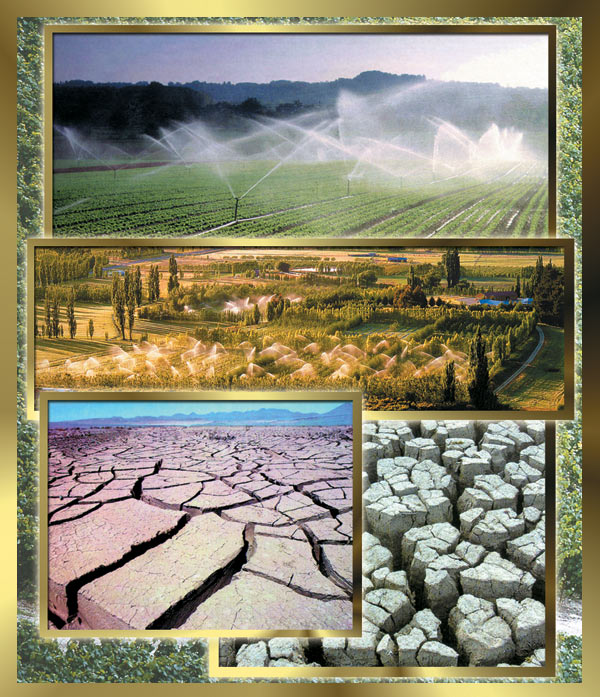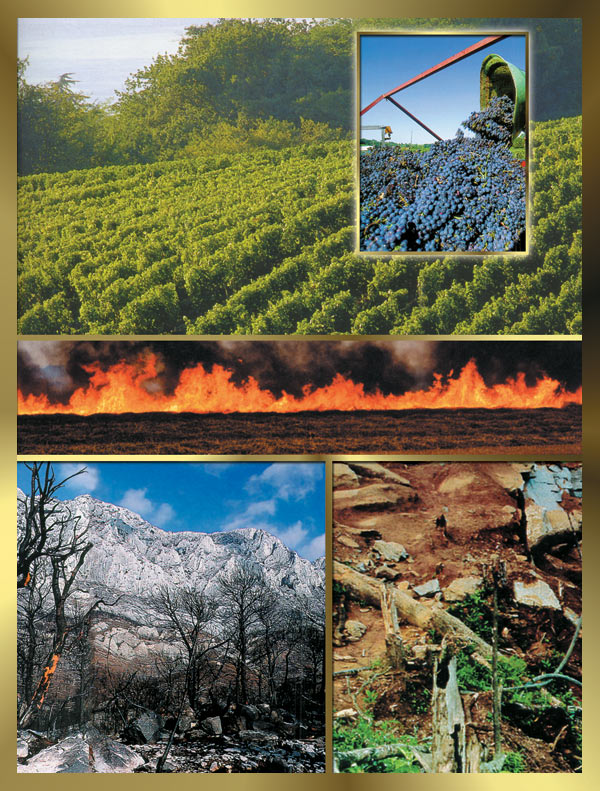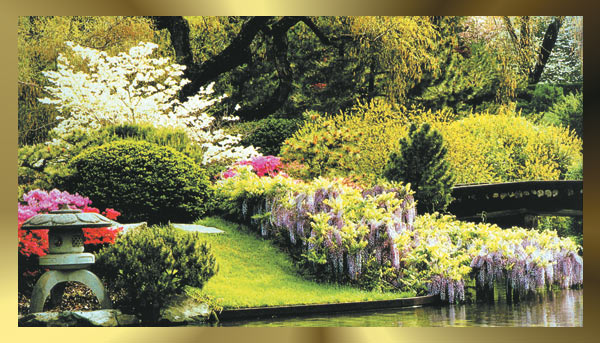In these verses, the believing garden owner reminds his proud friend of his helplessness by pointing out that he cannot prevent any disaster sent by Allah, and that showing arrogance in the face of this reality is to be thoughtless.
One of the greatest mistakes of people whose property and wealth make them vain is to forget that these, like all the beauty on Earth, are only temporary. Beauty and youth eventually give way to old age, just as health makes way for illness, incapacity, and weakness.
As all wealth is only temporary, Allah can make a poor person rich and destroy the wealth of a rich person in an instant. People can lose their houses, yachts, cars, or jewelry in floods, earthquakes, or other disasters in a matter of moments. No one can prevent a disaster sent by Allah. Anyone can lose loved ones, die, become disabled, suffer permanent injury, or lose his or her memory and faculties, for: "No misfortune occurs except with Allah's permission" (Surat at-Taghabun, 11). Such events cannot be prevented, reversed, or delayed. On such a day, neither wealth nor property will be of any use, for: "As for those who disbelieve, neither their wealth nor their children will ever save them from Allah in any way." (Surah Al `Imran, 10)
 Someone who considers his possessions (e.g., yachts, villas, and other property) safe forever, realizes his hopelessness after a tornado. Allah gives power, wealth, health, and wellbeing to whomever He wills. He also lets people grow old to show them His Signs and to remind them that just as with all of the world's adornments, they cannot even control their own bodies. |
Since eveyone experiences only what Allah has ordained, they should submit to and trust in Allah. The garden owner, in his conceit, ignored this truth when he claimed that nothing bad would befall his gardens or their produce until the end of time. He was certain that the river watering his gardens would remain there forever, that no pest would ever attack his produce, and that he would not face drought or similar disasters. He felt that his wealth, intelligence, and effort would be enough to protect his property.
However, Allah can easily turn everything on its head. The river could drain into the ground due to a small-scale tremor. Such a thing can happen in the blink of an eye, rendering the land arid and unproductive. Who, other than Allah, could bring the river back or make this man's field productive once again? Certainly his property and even all of his wealth could not help him here. This is what he earns for his conceit and ungratefulness. Those material things that he valued and claimed ownership over, which caused him to invent lies against Allah and to ascribe partners to Him, will not help him in the Hereafter, for:
Woe to every faultfinding backbiter who has amassed wealth and hoarded it! He thinks that his wealth will make him live forever. No indeed! He will be flung into the Shatterer. And what will convey to you what the Shatterer is? The kindled Fire of Allah reaching right into the heart. It is sealed in above them in towering columns. (Surat al-Humaza, 1-9)
Surat al-Kahf 40-41 also refers to the great gift of Allah willing soothing underground water to rise to the surface. Had this not been so, people would be in great difficulty. But thanks to wells and other means that enable us to reach the clear and mineral-rich underground water, we can benefit from this gift.

People who put their faith in others besides Allah, imploring them for mercy and trusting them, will not find what they seek. This is why they feel lost and lonely, especially in moments of trouble. They feel hopeless, confused, and deserted by their false deities in the face of this world's endless chaos and troubles.
Surat al-Isra' 22 proclaims: "Do not set up any other deity together with Allah lest you become disgraced and forsaken." Allah left the conceited garden owner stranded by removing all of his property and wealth through an unexpected disaster. In this tragic moment, the garden owner saw the truth and realized what a huge mistake he had made.

This example teaches us a valuable lesson: Those who consider themselves the owners of any power in the land can be made to realize their helplessness instantly by the will of Allah. Such people cannot help either themselves or those near to them. Everything is in Allah's power, and no one else can provide any benefit or cause harm. This reality is related in the following verse:
If Allah touches you with harm, none can remove it but Him. If He touches you with good, He has power over all things. (Surat al-An`am, 17)

Allah is humanity's only friend and protector. All beings besides Allah are only His creation and exist and—continue to exist—because of His will. Allah provides and heals, and brings about both laughter and tears. Every other being is endlessly helpless, poor, and dependent. They have no power and no ability in their own right, and do not have even the power to help themselves. No one other than Allah can be trusted, expected to help, and asked to provide for us.
This verse mentions lasting right actions, defined as good and beneficial deeds that comply with the Qur'an's morality and are pleasant to Allah. People should do right actions to win His good pleasure and grace, as well as Paradise, for these actions reveal the Muslims' patience and devotion. In sum, it shows that they are serious about their faith.
The intention behind each act is very important. A deed can be a right action only if it is done for Allah's good pleasure. If it is done with any other intention, it is no longer considered a right action and becomes a deed done for the pleasure of others. Allah describes such acts of worship that seek the pleasure of others in the following verses: :
So woe to those who establish prayer and are heedless of their prayer, those who show off and deny help to others. (Surat al-Ma`un, 4-7)
The same is true for charity, for some seek Allah's good pleasure while others seek only to impress. The difference between these people is explained, as follows:
The same is true for charity, for some seek Allah's good pleasure while others seek only to impress. The difference between these people is explained, as follows: O you who believe. Do not nullify your alms by demands for gratitude or insulting words, like him who spends his wealth, showing off to people and not believing in Allah and the Last Day.
His likeness is that of a smooth rock coated with soil, which, when a heavy rain falls on it, is left stripped bare. They have no power over anything they have earned. Allah does not guide unbelieving people. The metaphor of those who spend their wealth, desiring the good pleasure of Allah and firmness for themselves, is that of a garden on a hillside. When a heavy rain falls on it, it doubles its produce; and if a heavy rain does not fall, there is dew. Allah sees what you do. (Surat al-Baqara, 264-265)

Muslims who engage in right action must never forget that they are the ones who benefit from such actions. Allah is exalted and beyond any imperfection, and need. Therefore, He does not need the right actions of Muslims, a fact that is revealed in the Qur'an:
Mankind! You are the poor in need of Allah, whereas Allah is the Rich Beyond Need, the Praiseworthy. If He wills, He can dispense with you and bring about a new creation. That is not difficult for Allah. (Surah Fatir, 15-17)
Our Lord can do anything at anytime and has power over everything, as stated in: "… Do those who believe not know that if Allah had wanted to He could have guided all mankind?..." (Surat ar-Ra`d, 31). The Muslims' effort to spread Allah's religion is for their own good. Therefore, those who do right actions benefit only themselves and earn their reward in the Hereafter. According to the Qur'an: "Whoever strives only strives for himself. Allah is Rich Beyond Need of any being" (Surat al-`Ankabut, 6). Another aspect of right actions is their continuity. Some people find it easy enough to do a couple of good deeds a day, to give some charity, or to be selfless in some respect. They could be doing such things habitually or because they do not damage their interests. But what is really important is to do right actions throughout their lives, make an effort to win Allah's good pleasure, act selflessly, and work incessantly to spread His religion. They must continue to do so without ever giving up, even if no one else in their environment is obeying His commands. Thus, they will have proven their determination and the strength of their faith in Allah. As Allah proclaims:
Allah augments those who are guided by giving them greater guidance. In your Lord's sight, right actions that are lasting are better both in reward and the end-result. (Surah Maryam, 76)
The salvation awaiting believers who believe and do right actions throughout their lives is Allah's good pleasure and Paradise. Allah reveals this good news in the following verse:
As for those who believe and do right actions—We impose on no self any more than it can bear—they are the Companions of the Garden, remaining in it timelessly, forever. We will strip away any rancor in their hearts. Rivers will flow under them, and they will say: "Praise be to Allah, Who has guided us to this! We would not have been guided had Allah not guided us. The Messengers of our Lord came with the Truth." It will be proclaimed to them: "This is your Garden, which you have inherited for what you did." (Surat al-A`raf, 42-43)
Just as there is a time fixed for everyone's death, the universe also has a fixed time, known as "the Hour." But only Allah knows when the Hour will occur, as the following verse states:
Truly Allah has knowledge of the Hour, sends down abundant rain, and knows what is in the womb. No self knows what it will earn tomorrow, and no self knows in what land it will die. Allah is All-Knowing, All-Aware. (Surah Luqman, 34)
Surat al-Kahf relates some of the people's presumptions about when the Hour will come. Allah reveals that the Hour, thought to be far away by people, is approaching: "Mankind's reckoning has drawn very close to them, yet they heedlessly turn away" (Surat al-Anbiya', 1).
Most people believe that life on Earth will continue forever, that the Hour will never come, that death is nothingness, and that the Day of Judgment is a myth. While the Hour means an end to Earth, all that it holds, and everything else in the universe, it is not the final "end" rather, it is the beginning of the eternal life in the Hereafter.
Allah created each person from nothing, and Allah will take his or her life at the fixed time in destiny. In His presence, the day, the hour, and even the second, place, and circumstance of every person's death is known. Allah, beyond time and space, encompasses what to human knowledge is an unknown quantity: the time of one's death.
On the Day of Judgment, the believers will not fear, for Allah promises that: "My servants, you will feel no fear today; you will know no sorrow" (Surat az-Zukhruf, 68). However, it will be a very difficult day for the unbelievers.

The believers will receive their reward for the care and attention that they paid to winning Allah's good pleasure, to praying and worshipping as commanded, and to heeding Allah as required, in the nicest manner. Allah will not let them feel the panic, remorse, and sorrow felt by the unbelievers. He describes the believers' situation in the Hereafter in the following terms:
On the Day you see the male and female believers, with their light streaming out in front of them, and to their right: "Good news for you today of Gardens with rivers flowing under them, remaining in them timelessly, forever. That is the Great Victory." (Surat al-Hadid, 12)
 The train's past locations on the way, as well as its present and future locations, are all known and occur in the same moment in Allah's presence. The train's past locations on the way, as well as its present and future locations, are all known and occur in the same moment in Allah's presence. |
This verse describes the terror that the unbelievers will experience on the Day of Judgment, as well as their surprise that the Book confronts them with everything that they had done on Earth. One reason for their surprise is their ignorance of the fact that Allah controls and encompasses all times and events.
Given that Allah is not bound by such human notions of time as "past," "present," and "future," everything happens in His presence at the same time. Destiny is Allah's knowledge of everything there was, is, and will be, down to the last detail. Our Lord knows all of this, but His way of knowing differs from ours: He creates it all and is therefore in complete control of every moment of people's lives.
On the other hand, people witness the events written in their destiny by Allah, Who preserves them in one moment in His presence, only when is time for them to occur. But most people are unaware of this reality and so misunderstand the true nature of destiny. Some people believe that they can "change" or even "defeat" their own destiny. For example, let's say that you have an accident. Destiny means that all of the related circumstances, your survival, the severity of your injuries, and how long your treatments will last are all written in your destiny. You are still alive because that was your destiny. In other words, you did not "cheat" or "defeat" destiny, for your destiny cannot be changed. If you believe that it can be changed, you are only kidding yourself. It is yet again in their destiny to believe so. Destiny is the science of Allah, Who knows all times as the same moment, Who governs all space and time.
As a result, on the Day of Judgment people will find every one of their actions, words, and intentions brought before them. By the will of our Lord, long-forgotten details will be revealed. People might think that one of their evil or hurtful acts will be forgotten over time, but this is not the case with Allah, for to Him what happens on the Day of Judgment and what happened thousands of years ago exist within the same moment. And so it is a grave mistake to think that one's deeds will remain secret or be forgotten, or that they will never confront them again.
This verse points out the importance of obedience. Iblis did not prostrate before Adam and thus disobeyed Allah. Therefore, his defining characteristic is disobedience; whereas believers are known for their determined obedience to Allah, his Messengers, and His revelations.
In the lives of people and societies, obedience is very important. In any society, law and order are established by the obedience, respect, and trust that the people give to the state. Many verses command Muslims to obey those in authority, provided that the rulers do not deviate from true religion, and so envisions a society in which people live according the Qur'an's morality and thereby create an environment reflecting obedience and respect.
Religious morality prevents people from acts of violence and terror, because Allah forbids people to cause corruption. Some of these verses are as follows:
Seek the abode of the Hereafter with what Allah has given you, without forgetting your portion of this world. Do good, as Allah has been good to you. Do not seek to cause corruption in the land. Allah does not love corrupters. (Surat al-Qasas, 77)
… Give full measure and full weight. Do not diminish people's goods. Do not cause corruption in the land after it has been put right. That is better for you, if you are believers. (Surat al-A`raf, 85)
Those people who comprehend and live by religion's morality, therefore, naturally will do their best to refrain from engaging in any type of evil. They will adhere to the Qur'an's morals and acquire thereby contentment and inner peace, tolerance and a measured and non-provocative attitude, and seek to create harmony.

If the Qur'an's social model gains widespread acceptance in society, as opposed to Satan's path, peace and harmony will rule. Those people who oppose the police and other security forces, as well as meet them with anger and trouble, will no longer be able to justify such activities. Those who live according to Islam's morality are helpful and tolerant, side with the security forces, and make things easier for them. Thanks to the existence of such people, anarchy, terror, chaos, and hostility will vanish. The ongoing conflict between people, their arguments and disputes will cease, and all people will be able to go wherever they want, at any time, in complete safety.